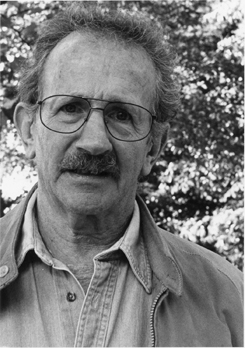One Art
BY PROF. VAROL AKMAN
Philip Levine (b. 1928)
For a couple years, maybe four or five, I really thought of myself as an anarchist. And then I stopped. For one thing, I bought a house. I could no longer say, "Property is theft."
Best known for his kindhearted, Whitmanesque poems about blue-collar America, Philip Levine was born in Detroit, Michigan, on January 10, 1928. As a young boy he was informed that his ancestry was Spanish. In light of the fact that both parents were born in a shtetl (small Jewish town) in Russia, he remains puzzled why they told him so. But he thinks it may have had something to do with the expulsion of the Jews from Spain in 1492. In any case, he got interested in Spain and the Spanish Civil War, and has great esteem for modern Spanish poets such as Antonio Machado and Federico García Lorca.
Levine's father died when he was five, leaving the family broke. He attended Wayne (now Wayne State) University, and after graduation took up a number of industrial jobs.
In the winter of 1953 I was working at Chevrolet Gear and Axle. […] I worked the night shift, from midnight to eight in the morning, then returned by bus to my apartment, slept for a time, and rose to try to write poetry, for I believed even then that if I could transform my experience into poetry I would give it the value and dignity it did not begin to possess on its own.
Levine's resentment at the way the workers were treated is evident in various poems, including the title poem from his 1991 National Book Award-winning collection, "What Work Is."
We stand in the rain in a long line
waiting at Ford Highland Park. For work
You know what work is -- if you're
old enough to read this you know what
work is, although you may not do it.
Forget you. This is about waiting,
shifting from one foot to another.
…
Levine left Detroit for good when he was 26 to study at the University of Iowa, earning an MFA degree from the Iowa Writers' Workshop. Levine's teachers there included Robert Lowell and John Berryman, legendary formalists. In 1957, Levine relocated to California with his family. Yvor Winters, another eminent formalist at Stanford, became a mentor and supported the young poet. Levine thinks that his early formalist output was needed, for it compensated for the formlessness of his own life back then.
Levine published his debut collection of poems, "On the Edge," relatively late (1963). "The Names of the Lost" won the Lenore Marshall Award for the best book of poetry in 1976. Two of his 1979 volumes, "Ashes: Poems New and Old" and "7 Years from Somewhere," earned the National Book Critics Circle Award. "Ashes" also received the American Book Award (1980). In 1987 Levine received the Ruth Lilly Poetry Prize. Awarded by Poetry magazine and the American Council for the Arts, the prize cited his "distinguished poetic achievements." In 1995 the Pulitzer Prize for poetry went to his "The Simple Truth."
Critics Circle Award. "Ashes" also received the American Book Award (1980). In 1987 Levine received the Ruth Lilly Poetry Prize. Awarded by Poetry magazine and the American Council for the Arts, the prize cited his "distinguished poetic achievements." In 1995 the Pulitzer Prize for poetry went to his "The Simple Truth."
In 1997, Levine was elected a member of the American Academy of Arts and Letters. He served as chancellor of the Academy of American Poets from 2000 to 2006. Since August 2011, Levine has been the poet laureate of the United States. Always tongue-in-cheek, Levine quips that as the newly named laureate he may propose a national project in which people will be asked to name the ugliest poem they can think of.
From Levine's vast oeuvre I chose "A Theory of Prosody" for two reasons. First, it illustrates the proverbial nature of cats in a great way. I used to believe that cats behaved erratically perhaps out of malice (and certainly out of unappreciativeness) toward us. Now I think they are noble beings but we often fail to comprehend their warning signs.
aybe more importantly, I like the whimsical title of this poem. Prosody covers all the elements of language that contribute toward acoustic and metrical effects. But Ezra Pound thought that prosody should also be regarded as articulation of the "total sound" of a poem, and it is in this sense that the tale of Nellie succeeds splendidly.
NOTES
The quote concerning the Chevrolet job is from Levine's "The Bread of Time: Toward an Autobiography," Alfred A. Knopf (1994).
George Saintsbury, the leading English literary critic of the early 20th century, filled no fewer than three volumes in writing "A History of English Prosody from the 12th Century to the Present" (1906-1910).
"A Theory of Prosody" appears in Levine's "New Selected Poems" (1991).
ACKNOWLEDGMENTS
This is my 25th column. I would like to thank the editors of Bilkent News for their meticulous work. And I am indebted to my managing editor for giving me so much wise advice.
A Theory of Prosody
When Nellie, my old pussy
cat, was still in her prime,
she would sit behind me
as I wrote, and when the line
got too long she'd reach
one sudden black foreleg down
and paw at the moving hand,
the offensive one. The first
time she drew blood I learned
it was poetic to end
a line anywhere to keep her
quiet. After all, many morn-
ings she'd gotten to the chair
long before I was even up.
Those nights I couldn't sleep
she'd come and sit in my lap
to calm me. So I figured
I owed her the short cat line.
She's dead now almost nine years,
…